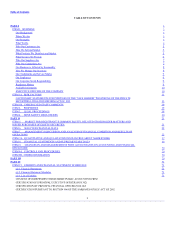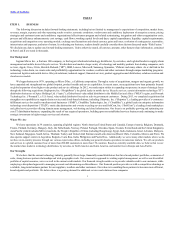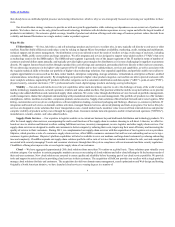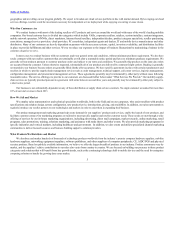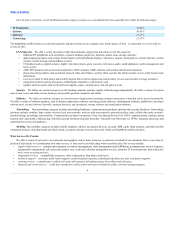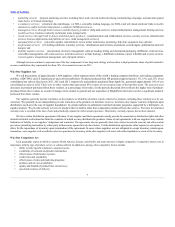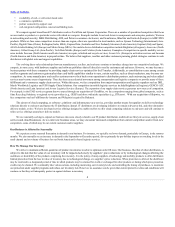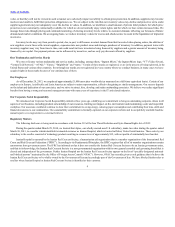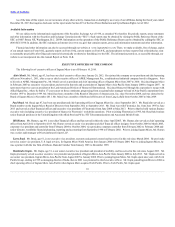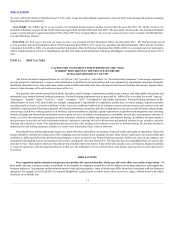Ingram Micro 2013 Annual Report Download - page 12
Download and view the complete annual report
Please find page 12 of the 2013 Ingram Micro annual report below. You can navigate through the pages in the report by either clicking on the pages listed below, or by using the keyword search tool below to find specific information within the annual report.
Table of Contents
and Africa, with products and solutions covering data center, storage, security, networking and software categories, including technical services; Promark, a
value-added distributor in the U.S. with a core technology focus on data storage, data management and electronic document imaging products and services;
Shipwire, a leading provider of e-commerce fulfillment services for SMBs, CloudBlue, a global leader in enterprise ITAD, onsite data destruction and e-waste
recycling services and SoftCom, a leading cloud marketplace and global service provider offering domain name management, web hosting and cloud
infrastructure.
Significant risks and uncertainties related to our acquisition and investment strategies which could materially and adversely affect our financial
performance include the following:
•distraction of management’s attention away from normal business operations while coordinating and integrating a geographically dispersed
organization;
•insufficient profit generation to offset liabilities assumed and expenses associated with the strategy;
•inability to successfully integrate the acquired businesses, which may be more difficult, costly or time-consuming than anticipated, including
inability to retain key employees, difficulties with integrating different business systems and technology platforms and consolidating corporate,
administrative, technological and operational infrastructures;
•inability to preserve our and the acquired company’s customer, supplier and other important relationships;
•inability to adapt to challenges of new markets, including geographies, products and services, or to identify new profitable business opportunities
from expansion of existing products or services;
•inability to adequately bridge possible differences in cultures and management philosophies;
•exposure to new regulations, such as those relating to U.S. federal government procurement regulations, those in new geographies or those applicable to
new products or services;
•substantial increases in our debt; and
•issues not discovered in our due diligence process.
In addition, we may divest business units that do not meet our strategic, financial and/or risk tolerance objectives. No assurance can be given that we
will be able to dispose of business units on favorable terms or without significant costs.
We are dependent on a variety of information systems, which, if not properly functioning and available, or if we experience system security
breaches, data protection breaches, or other cyber-attacks, could adversely disrupt our business and harm our reputation and net sales. We
depend on a variety of information systems for our operations, many of which are proprietary, which have historically supported many of our business
operations such as inventory and order management, shipping, receiving, and accounting. Because most of our information systems consist of a number of
internally developed applications, it can be more difficult to upgrade or adapt them compared to commercially available software solutions.
We are currently in the process of migrating our operations from our legacy proprietary system that was developed in the late-1980s to SAP in a phased,
country-by-country approach. We have deployed SAP in several operations globally beginning in 2009, with our most recent deployment in early 2013 in
Colombia. Due to challenges in our earlier round of implementations, additional deployments have been on hold as we continue to address certain
improvements within the system to better address our internal and customer needs. We are continuing to evaluate our schedule for deploying the enterprise
system in additional locations. While we will adjust the deployment schedule as required to best serve our customers, we can make no assurances that we will
not have disruptions, delays and/or negative business impacts from forthcoming deployments.
Any disruptions, delays or deficiencies in the design and implementation of the new ERP system, or in the performance of our legacy systems could
adversely affect our ability to effectively run and manage our business and potentially our customers’ ability to access our price and product availability
information or place orders. Portions of our IT infrastructure also may experience interruptions, delays or cessations of service or produce errors in connection
with systems integration or migration work that takes place from time to time. We may not be successful in implementing new systems and transitioning data,
which could cause business disruptions and be more expensive, time consuming, disruptive and resource-intensive. Such disruptions could adversely impact
our ability to fulfill orders and interrupt other processes. We may also be limited in our ability to integrate any new business that we may acquire. If our
information systems do not allow us to transmit accurate information, even for a short period of time, to key decision makers, the ability to manage our
business could be disrupted and the results of operations and our financial condition could be adversely affected. Failure to properly or adequately address
these issues could impact our ability to perform necessary business operations, which could adversely affect our reputation, competitive position, business,
results of operations and financial condition.
We also rely on the Internet for a significant percentage of our orders and information exchanges with our customers. The Internet, in general, and
individual websites have experienced a number of disruptions, slowdowns and security breaches, some of which were caused by organized attacks. To date,
we do not believe that our website and systems have experienced any material breakdowns, disruptions or breaches in security; however, we cannot assure
that this will not occur in the future. If we were to experience a security breakdown, disruption or breach that compromised sensitive information, this could
harm our relationships with our customers, suppliers or associates; impair our order processing; or more generally prevent our customers and suppliers from
accessing information, which could cause us to lose business. Experienced computer programmers and hackers may be able
12


